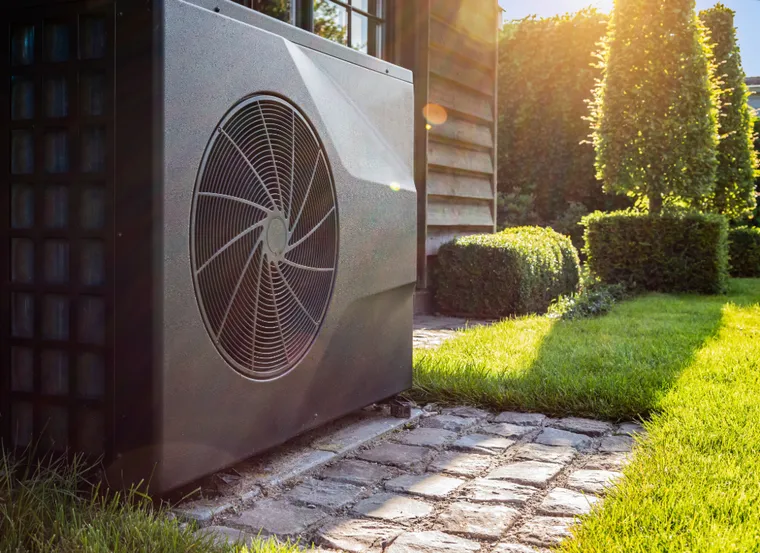If you're looking for an energy-efficient way to heat and cool your home, heat pump systems might just be the perfect solution. These versatile systems work by transferring heat rather than generating it, making them much more efficient compared to traditional HVAC systems. Whether you live in a mild or cold climate, heat pumps offer impressive energy savings and year-round comfort.
What Exactly Is a Heat Pump?
Simply put, a heat pump is a device that uses electricity to move heat between spaces. In the winter, it pulls heat from outside to warm your home, and in the summer, it removes heat to keep things cool.
Unlike furnaces or air conditioners that generate heat or cold air, heat pumps transfer heat, which makes them incredibly energy-efficient.
Real estate professionals can learn more about the benefits of heat pumps and other upgrades in Real Estate Continuing Education courses to show clients how these systems improve home value and energy efficiency.
Types of Heat Pumps
There are several types of heat pumps, each designed to fit different homes and climates:
- Air-Source Heat Pumps (ASHPs): These are the most common type, transferring heat between your home’s air and the outdoor environment. They work well even in areas with subfreezing temperatures.
- Ducted Systems are ideal if you already have ductwork.
- Ductless Mini-Split Systems are great for homes without ducts or for targeted zone heating.
- Reverse Cycle Chillers provide hot and cold water, making them perfect for radiant floor heating systems.
- Ground-Source (Geothermal) Heat Pumps: These systems tap into the earth's constant temperature for efficient heating and cooling. While the upfront cost is higher, they are durable—ground loops can last up to 50 years!
- Horizontal Systems work well if you have plenty of land.
- Vertical Systems are perfect for smaller or rocky plots.
- Pond/Lake Systems use a nearby water body for heat exchange.
- Absorption Heat Pumps: Sometimes called gas-fired heat pumps, they use energy from natural gas, propane, or even solar-heated water. These systems are excellent for large homes or commercial properties.
- Cold-Climate Heat Pumps: Designed to perform efficiently even in extreme cold (as low as 5°F), these are ideal for northern climates where winters get brutal.
- Hybrid (Dual-Fuel) Heat Pumps: These combine a heat pump with a gas furnace. The heat pump handles mild heating needs, and the furnace kicks in during extremely cold weather.
Why Choose a Heat Pump?
Here’s why homeowners and real estate professionals should consider heat pumps:
- Energy Efficiency: Heat pumps can deliver 2 to 4 times the energy they consume.
- Year-Round Comfort: They provide both heating and cooling, so you don’t need separate systems.
- Cost Savings: Today's heat pump can reduce your electricity use for heating by up to 75% compared to electric resistance heating such as furnaces and baseboard heaters
- Environmental Benefits: Reduced greenhouse gas emissions make heat pumps a greener choice.
- Better Air Quality: Many models include advanced filtration to remove dust, pollen, and allergens.
Key Considerations When Choosing a Heat Pump
Before you install a heat pump, consider these important factors:
- Climate: Choose a model designed for your region’s temperature range.
- Efficiency Ratings: Look for high HSPF (Heating Season Performance Factor) for heating and SEER (Seasonal Energy Efficiency Ratio) for cooling.
- System Type: Decide if a ducted or ductless system works better for your home.
- Installation Costs: While upfront costs can vary, don’t forget to look into tax credits or incentives to offset expenses.
- Maintenance Needs: Regular upkeep will keep your system running at peak efficiency.
Heat Pump Maintenance Tips
To get the most out of your heat pump, follow these simple maintenance tips:
- Change Filters Regularly: every 1-3 months. Better filtration is available from 1-inch pleated filters with higher MERV ratings, which improve indoor air quality. While thicker pleated filters (more than 1 inch) can also provide superior filtration, they typically require a modification to the filter cabinet.
- Clean Outdoor Coils: Clean heat pump outdoor coils whenever they appear dirty. With the power to the fan turned off, remove vegetation, dust, pollen, and clutter from around the outdoor unit.
- Inspect Ductwork: Seal leaks to prevent energy loss.
- Professional Servicing: Schedule annual check-ups to make sure everything is running smoothly.
- Avoid Overusing Auxiliary Heating: Use backup systems like electric resistance heaters sparingly to keep costs down.
Innovations in Heat Pump Technology
Heat pump technology has come a long way. Features like variable-speed compressors and inverter technology allow systems to adjust to your heating or cooling needs, improving energy efficiency and precision.
Also, innovations like dual-speed motors and desuperheaters even make it possible to use waste heat for hot water production—a bonus for homeowners looking to save even more!
Cost and Long-Term Savings
While the initial cost of heat pumps—especially geothermal systems—can seem steep, the long-term savings on energy bills often make them worth the investment. Plus, federal and state incentives can help significantly reduce installation costs. Over time, a heat pump can be one of the most cost-effective and energy-efficient upgrades you make to your home.
For real estate professionals, including heat pump and energy-efficient upgrade material in the Real Estate CE/License Renewal Courses you choose can help you better understand energy-efficient solutions that appeal to modern homebuyers.

